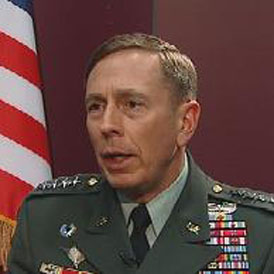Petraeus: Taliban ‘will be back’ in Afghanistan
After a period of relative quiet over winter months, U.S. General David Petraeus tells Channel 4 News he expects a ‘spring offensive’ from the Taliban but insists withdrawal plans are on track.

Speaking to General Petraeus, Commander of the U.S. Forces in Afghanistan and International Security Assistance Force (ISAF), Jon Snow asked one of the world’s most decorated military officials about what he invisioned for the immediate years ahead in Afghanistan and the growing threat from the spread of Al Qaeda away from their original base.
Despite there being a lack of reported Taliban activity in recent months, put down to some extent to the harsh winter climate in Afghanistan, General Petraeus told Jon Snow how he expected a resurgence over the coming months but that forces were prepared to combat this:
“They will be back but indeed over the course of the last six to eight months there is no question we have taken away very important districts from the Taliban, Jari and Panjwai and Arghandab districts in Kandahar province, further areas in Helmand province, areas in the east, and the greater Kabul security bubble.
“There will be a Taliban spring offensive, there will also be an ISAF and Afghan Force offensive and we will of course do everything we can not only to hang on to the areas we now control together but to expand these areas, to increase the security bubbles as we say, indeed we’re linking up the security bubble right now between Helmand province and Kandahar province, very good work from UK forces.”
Earlier, Hamid Karzai spoke openly about an expediated desire to see an end to international forces’ presence in Afghanistan, tabling the end of 2014 as a genuine target to achieve this. The Afghan president said: “The Afghan nation doesn’t want the defence of this country to be in the hands of others anymore. Therefore we have agreed with the world that the security responsibilities of Afghans should be turned over to Afghans.”
General Petraeus told Channel 4 News how he shared this optimistic goal with the Afghan leader and other international leaders but had a pragmatic outlook to how the situation in the region might develop:
“The objective agreed to by the leaders of the troop contributing countries at Lisbon last November was Afghan forces in the lead performing the security tasks by the end of 2014. I think the progress of the past 6-8 months puts us on a glide path towards that but make no mistake about it, I told Congress the progress, whilst significant, is fragile, it is reversible and there will be tough fighting ahead.”
The general would not be pushed on whether there needed to be more attention paid to Yemen in light of the fact that current President Ali Abdullah Saleh is under increased scrutiny to stand down amidst a growing presence of Al Qaeda in the country. He did admit that there has been a growth in Al Qaeda in Yemen however:
“We have worked very hard with our partners in Yemen … to help them deal more efffectively with the challenges that eminated from what came to be called Al Qaeda in the Arabian Peninsula.”
Jon questioned General Petraeus on the U.S. involvement in Libya, another conflict that the U.S. took some length deciding just how they would be involved:
“Countries, my own country included, take their decisions based on their own calculations. There is a very substantial capability of the United States but at times there is the desire that other countries take the lead in certain areas and in certain missions. This was the case at certain times in the Balkans as you’ll recall.”
The general also insisted that no resources from conflicts elsewhere had been re-deployed in the military action taking place in North Africa.
WASHINGTON CORRESPONDENT SARAH SMITH BLOGS: Obama Supports Libya action, but it must be asked, why
-
Latest news
-
‘Russian aggressions have never pushed Georgia to deviate from its own path’, says Georgian President5m

-
Why is Georgia’s ruling party so intent on adopting ‘foreign influence’ bill?5m

-
Trump’s lawyers try to paint Michael Cohen as liar out for revenge at trial3m

-
England’s schools told not teach gender identity2m

-
Slovakia PM shooting: Suspect charged with attempted murder3m

-




